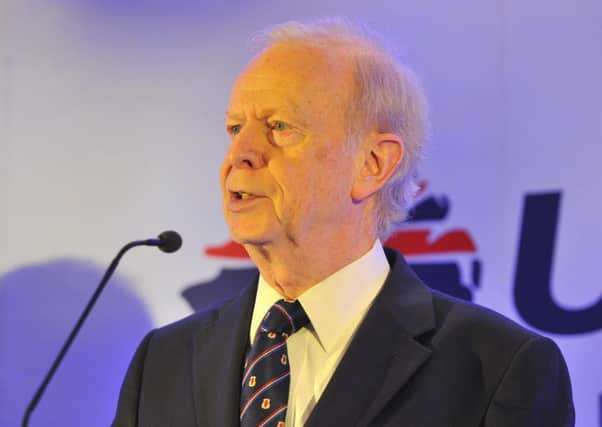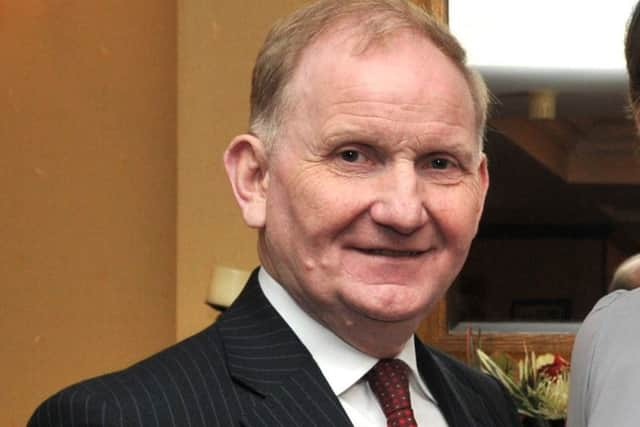Unionist peers’ guarded welcome for moves to block pension for paramilitaries


However, both Lord Morrow and Lord Empey have said they will closely monitor progress towards the final draft of the Northern Ireland (Executive Formation) Bill.
The two peers were commenting after a number of amendments to the Bill were fast tracked through the Commons on Thursday.
Advertisement
Hide AdAdvertisement
Hide AdThere was widespread anger among many victims’ groups earlier this week when Victims’ Commissioner Judith Thompson reiterated her support for a pension for all those severely injured during the Troubles – including terrorists with self-inflicted injuries.


A Dublin man who lost his father and sister, and suffered life-changing injuries, when the UVF bombed the city in 1974, said he would rather “walk around in pain” for the rest of his life than take a pension that equated victims and perpetrators.
“You can’t tell me that Sean Kelly the Shankill Road bomber has the right to access a pension. That is just an insult,” Edward O’Neill told the News Letter.
During a Lords’ debate on the Bill on Wednesday night, NIO minister Lord Duncan gave an assurance that all eligibility criteria procedures for a pension will “abide by the ‘no fault of their own’ principle”.
Advertisement
Hide AdAdvertisement
Hide AdLord Duncan’s remarks followed the proposal from former NI secretary Lord Hain that: “The secretary of state must make regulations to give effect to a pension for those severely injured through no fault of their own during the period known as the Northern Ireland Troubles.”
However, the wording of the final amendment, which was among a number of changes ratified by MPs on Thursday, stops short of blocking payments to former paramilitaries.
The clause states: “Regulations ... must make provision as to the eligibility criteria for payments under the scheme which may, in particular, relate to: the nature or extent of a person’s injury; how, when or where the injury was sustained ... and whether or not a person has been convicted of an offence”, and adds, “payments to be reduced or repaid (in whole or in part) in specified circumstances”.
DUP peer Lord Morrow said he was “not entirely happy,” but added: “We did seek some assurances, and we got those assurances.”
Advertisement
Hide AdAdvertisement
Hide AdHe said: “Whenever Lord Hain said that he was making it abundantly clear, that his aim was that a victim, in his opinion, was someone hurt at the hand of someone else; in other words, it wasn’t self-inflicted.
“If a victim is not treated as a victim, and a victim maker is not treated as a victim maker, then we will continue to have this problem and we will be returning to it.”
Lord Empey said he had serious concerns over the speed at which the legislation was being rushed through the Commons, but said there have been lengthy discussions around the definition of a victim in the Lords.
“I think we are reasonably reassured but, when you are dealing with so many issues in the space of two days, it’s not the way to do business. But I think we’ve done the best we could in the time available.”
Advertisement
Hide AdAdvertisement
Hide AdLord Empey said it was worth noting that, although the wording of the Lord Hain proposal stops short of blocking terrorists from accessing a pension, the debates in the Lords made it clear that the will of Parliament was former paramilitaries should not benefit.
“Every single speaker took the same position,” Lord Empey added.
“I’m not a lawyer, but the intention of the House could not have been clearer. In specific regard to the pension, I am happier today with what the minister has put on record,”
• Two senior Alliance representatives have been challenged over claims only a small number of former paramilitaries are likely to benefit from the proposed Troubles pension.
Advertisement
Hide AdAdvertisement
Hide AdStephen Farry tweeted his support for a Troubles pension to be implemented, and said: “This can’t be constantly held back due to a debate on where less than 10 people are in or out.”
Trevor Lunn supported his party colleague, saying: “Less than a dozen perpetrators, half of whom would refuse a British pension anyway. Time to move on, swallow the pill for the greater good.”
Mairia Cahill said she was “shocked” at the Alliance assertion, and added: “The scheme is open which means figures would change – however the real danger is the precedent it sets.”
Former senior police officer Jim Gamble tweeted: “The slippery slope is suggesting that because less than 12 paramilitary thugs will receive a state pension paid by the taxes of their victims that some greater good is being achieved. Any terrorist receiving payment is wrong & you know it. You are on the slippery slope.”
Advertisement
Hide AdAdvertisement
Hide AdStephen Farry’s tweet in full said: “Definition of a victim has been a long-running political issue. There are hundreds and hundreds of victims that continue to suffer from life-limiting conditions and urgently need help. This can’t be constantly held back due to a debate on where less than 10 people are in or out.”
Mr Farry was responding to a comment from UUP MLA Doug Beattie, that said: “Perpetrators should not benefit from any Victims and Survivors Pension. We fully support a pension for innocent victims but it is not acceptable to include those injured by their own hand.”